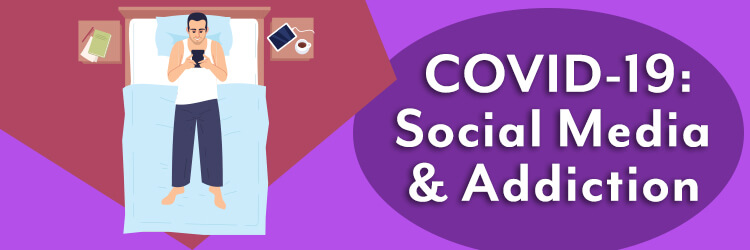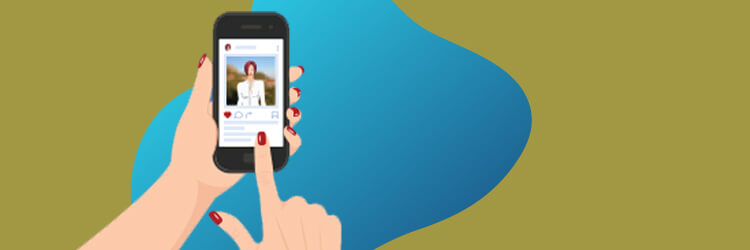[vc_row][vc_column][vc_column_text]I’m almost five years sober, but I often get ads on Instagram for alcohol. I hide them, and occasionally hit “report.” Then they just advertise different brands of alcohol to me.
Luckily, I am far enough along in my recovery that hiding the ads suffices. For someone new in recovery or struggling to get sober, those ads could be harmful.
Like with a lot of other things in life, social media can be both beneficial and not-so-beneficial. During the COVID-19 crisis, it gives us another way to connect. I’ve seen numerous recovery support groups on Facebook. Searching the hashtag “RecoveryPosse” on Twitter reveals a huge network of strangers supporting each other’s sobriety during the pandemic (and always). I follow a bunch of sober accounts on Instagram—a good balance for all the alcohol advertisements.
But too much time on social media may be detrimental to mental health. Multiple studies have found a correlation between more time on social media and symptoms of Depression. One study found that the same wasn’t true for watching TV, which means it can’t be explained by overuse of screens.
Since social media is relatively new in the scheme of things, there are a lot of unanswered questions. For instance, are people who are Depressed more likely to use social media often, is social media causing or exacerbating symptoms, or is it some combination?
We’re not sure if social media is causing Depression, but it seems from both research and anecdotal evidence that it can stir up negative emotions. People scrolling through social media pass through only the best parts of other people’s lives. This could lead to comparisons and the feeling of coming up short, which in turn can cause low self-esteem and loneliness. This is a bad combination for someone struggling with mental health. Adolescents, who tend to be concerned about other people’s opinions of them, are particularly susceptible to making comparisons.
I’ve written on this blog before about the abundance of drinking memes circulating during the pandemic. This is another downfall of social media. If someone is struggling to stay sober during the pandemic, seeing images of people day-drinking and making light of potential problems might cause them to rationlize drinking. This could be especially hard if someone is isolating.
A study of over 25,00 people showed that social media engagement has increased by 61% since the pandemic. People stuck at home are on their phones more often. You’d think there’s not as much to compare yourself to when most people are staying home, but that would be false.
While some people are struggling just to make it through the day during the pandemic, they may pass photos of beautifully baked bread or lists of accomplishments someone has finally had the time to do. This could make a person feel bad for feeling bad, creating a negative cycle for mental health.
There are places on the Internet to go if you want to support your mental health. If you fill your feed with some of the many great mental health and recovery accounts, it can help make your experience of social media more affirming. There are also some funny sober accounts; I find it helpful when I’m not feeling my best to laugh at things I relate to.
Some great Instagram accounts about mental health or addiction are: @makedaisychains, @melaninandmentalhealth, @brutalrecovery, @facebooksober, and @brenébrown, just to name a few. If you look through the “following” list of some of your favorite accounts, you can find many more—a whole community of people using social media to destigmatize addiction and mental health disorders.
If you are struggling with a substance use or mental health disorder during this trying time, there is hope. TruHealing Centers is open throughout the COVID-19 crisis, with hospital-grade sanitization of our facilities and telehealth options, so that you can feel safe in treatment. At our recovery centers across the country, we will help you work through the root causes of your addiction and build a life in long-term recovery. Call an admissions specialist at 410-593-0005.[/vc_column_text][/vc_column][/vc_row]









